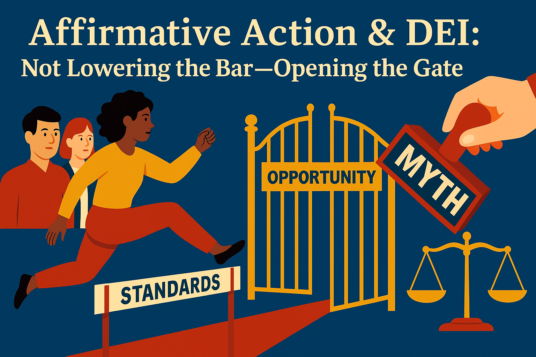These policies never meant “hiring the unqualified.” They meant letting qualified Black Americans be seen.
By Theresa E. Beverly
The loudest myth about Affirmative Action and DEI is that they were tools to hand unearned jobs to unqualified Black people. The truth is simpler and provable: these policies were designed to ensure that qualified Black candidates were no longer excluded before they could be fairly considered.
What Affirmative Action Actually Was for Decades
In 1965, the federal government told agencies and (later) contractors they must prohibit discrimination and run “a positive, continuing program” to realize equal opportunity, because discrimination was the norm, not the exception. That mandate (Executive Order 11246) didn’t force quotas; it forced fairness in access and outreach. EEOC+1
In January 2025, a new Executive Order revoked 11246 and told agencies to wind down those requirements that the policy existed to open doors, and that the fight over whether those doors should remain open is very much alive today. The White House+2DOL+2
What DEI Is and Isn’t
Professional HR standards define Diversity as representation and Inclusion as creating structures where people can contribute and advance based on merit and performance. That’s the opposite of “lowering standards.” When done right, DEI removes barriers so merit can actually decide outcomes instead of hidden networks doing it behind closed doors. SHRM+1
Why These Policies Were Needed (and Still Are)
Labor-market studies show the problem plainly. In a landmark field experiment, identical résumés with “white-sounding” names received 50% more callbacks than those with “Black-sounding” names. A 2017 meta-analysis found no meaningful decline in hiring discrimination against Black applicants over decades. That’s not “ancient history,” that’s a stubborn present. American Economic Association+2sendhil.org+2
When people say, “We don’t need DEI, just hire on merit,” the question is: who gets seen as meritorious and who even gets seen at all?
“Good Old Boy” Networking Isn’t Merit
America often fills top roles through personal loyalty, donor circuits, and private networks, not open competitions. Look at the public record: across administrations, some cabinet secretaries are chosen for ideology or connections over subject-matter depth. (One example that drew bipartisan concern: Betsy DeVos, confirmed as Education Secretary after a contentious hearing that highlighted her limited grasp of basic education law and policy.) That isn’t a knock on one party; it’s a reminder that networking ≠ merit, which is exactly why transparency and fair-access policies matter. American Council on Education
If Blacks Were “Inferior,” Explain the Record
Despite centuries of barriers, Black Americans have excelled across fields. A few among thousands:
-
Space & Computing: Katherine Johnson’s orbital mechanics made John Glenn’s flight and Apollo rendezvous possible; Gladys West’s geodesy underpins modern GPS; Mark Dean co-created the IBM PC architecture and led key graphics and processor breakthroughs. IBM+3NASA+3NASA+3
-
Medicine: Daniel Hale Williams performed one of the first successful open-heart surgeries in 1893 and founded Provident Hospital, the first Black-owned hospital in the U.S. Encyclopedia Britannica
-
Business & Leadership: Ursula Burns became the first Black woman CEO of a Fortune 500 company (Xerox), later chairing boards and advising global firms. Wikipedia
-
Law & Government: From Barack Obama to Ketanji Brown Jackson, leadership has reached the presidency and the Supreme Court. (Their résumés speak for themselves.)
-
Arts, Sports, and Beyond: Toni Morrison (Nobel Literature), Serena Williams (23 Grand Slams), Beyoncé (record-setting Grammys), and so many more.
These aren’t edge cases; they’re mile markers on a highway traveled by millions of Black teachers, nurses, engineers, entrepreneurs, soldiers, scientists, pastors, and public servants who carry communities every day, often without headlines.
The Principle We Should All Agree On
Merit can only rule where access is real. Affirmative Action (as it long existed) and modern DEI, at their best, are guardrails to keep doors open and evaluations fair. They don’t demand you hire the unqualified; they require you to find, consider, and reward the qualified, wherever they are, whatever their name sounds like, and whomever their friends are.
If we want America to be the land of opportunity, then we must insist on systems that let opportunity be seen.
Author bio: Theresa E. Beverly is the publisher of Reporter Monthly Newspaper. She writes about health, civic life, faith, and the future of opportunity.


